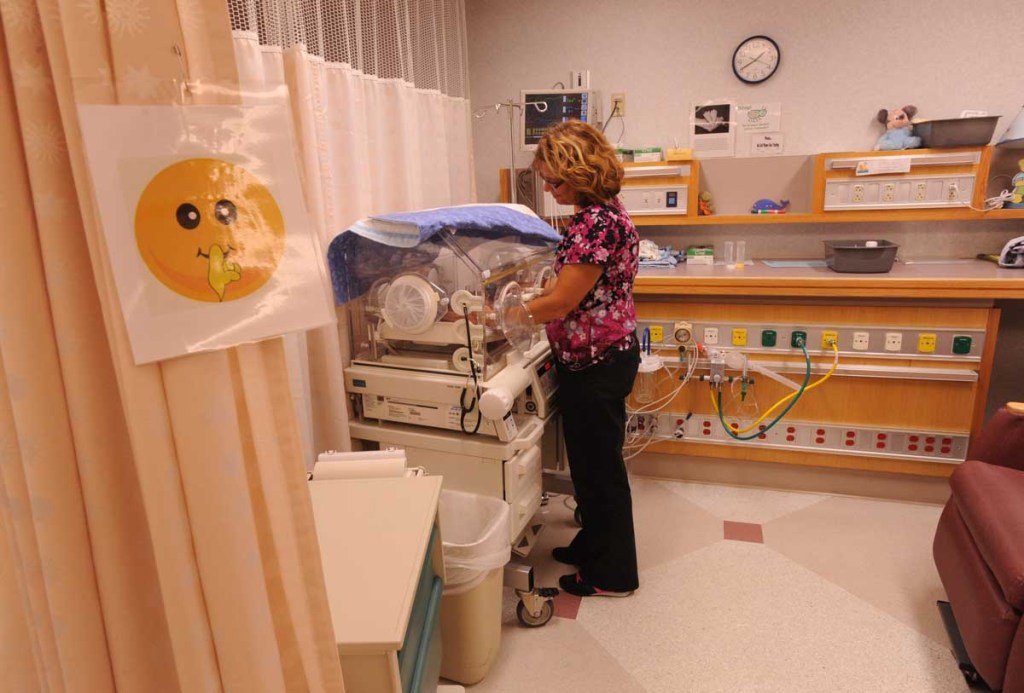Pennsylvania region sees jump in number of addicted newborns
Published 2:30 pm Monday, September 7, 2015

- Registered nurse Patty Wingard checks on a baby Aug. 27, 2015, at Conemaugh Memorial medical Center's regional intensive care nursery.
Kary Garretson was high on heroin when she was in a car accident and nurses informed her she was 41/2 months pregnant.
Garretson used heroin the day her baby was born.
Trending
“I remember lying in that hospital bed thinking, ‘I don’t know what to do with this baby,’ ” she said.
“Then they put him in my arms and it changed my life.
“Nothing else mattered. All I cared about was being the best mom I could be.”
Garretson, formerly of Frederick, Maryland, and now of Windber, Pennsylvania, turned her life around through treatment and counseling.
Her son, Caleb, is now a healthy 9-year-old.
But professionals say a baby born addicted to drugs, especially heroin, faces immediate painful withdrawal and then a difficult future.
Trending
And the number of children born addicted in the Johnstown, Pennsylvania region, 60 miles east of Pittsburgh, has jumped dramatically.
Dr. John Chan, head of the neonatal/prenatal medicine unit of Conemaugh Memorial Medical Center, said when he arrived in Johnstown 19 years ago, bringing drug-addicted babies into the world was an anomaly – happening a handful of times a year. Now, the hospital sees several each week.
“The numbers are rising every year … it’s almost 30 percent (of births),” Chan said. “Nineteen years ago, you didn’t see it.”
When Garretson’s baby was born, he went through 12 hours of withdrawal symptoms, she said.
Nurses, doctors and addiction experts say there’s nothing that compares to the first cry of an addicted newborn.
Such babies are often smaller than normal, with nerve endings so sensitive they can’t stand to be touched.
“That cry these babies give makes the hair on the back of your neck stand up,” said Paula Eppley-Newman, executive director of Beginnings Inc., a Johnstown-based early childhood program. “That shrill, piercing cry cuts right through you.
Because of the changes drugs such as heroin make in the human brain, even while still in the womb babies have a psychological addiction as well as a physical dependency on the drug, Chan said.
The National Institute on Drug Abuse says that every hour in this country, a baby is born suffering from opiate withdrawal.
Neonatal abstinence syndrome, or NAS, refers to the range of conditions addicted newborns can experience.
The March of Dimes says NAS babies are more likely than others to be born with low birthweight, have problems with breathing and feeding, and experience seizures. NAS babies usually stay in the hospital longer than nonaddicted newborns.
The National Institute of Drug Abuse says the number of babies born with NAS tripled from 2000-09, when an estimated 13,500 babies were born addicted.
Those national numbers mirror a troubling local trend.
According to data from the Pennsylvania Department of Health, Cambria County reported 172 births involving children exposed to drugs in 2013-14.
That puts Cambria more than 150 births ahead of the total seen at all hospitals in the city of Pittsburgh.
Cambria also reported more drug-related births than Dauphin County, home to the state Capitol, which reported 160 births.
Blair County reported 200 such births, and hospitals in the city of Philadelphia saw 289.
As heroin use spreads to rural areas, Chan said, Duke LifePoint’s Conemaugh Memorial has become the central treatment center for addicted babies.
“Nason (Roaring Spring), Bedford, Somerset, others, they send us their babies because we are better equipped to deal with the addictions,” Chan said.
Women who attempt to get off the drugs while pregnant – even those acting out of concern for the babies they are carrying – can bring unintended problems, experts say.
“If they withdraw, then they can lose the baby or are more likely to have it premature, which often creates other problems,” Chan said.
After Caleb’s first birthday, Garretson and her parents, Gary and Peggy Masorjak, moved back to Windber. Garretson got involved with Flood City Church in Richland, where she met her husband now of five years, Chris. The couple have two other children: Micah, 3, and Gabriel, 1.
She still can’t believe the obstacles she overcame to reach nine years of sobriety and turn her life around.
She says addicts are “people who can change.”
“Addiction doesn’t define you,” she said, “because you can come out of it and be someone you never thought you’d be.”





